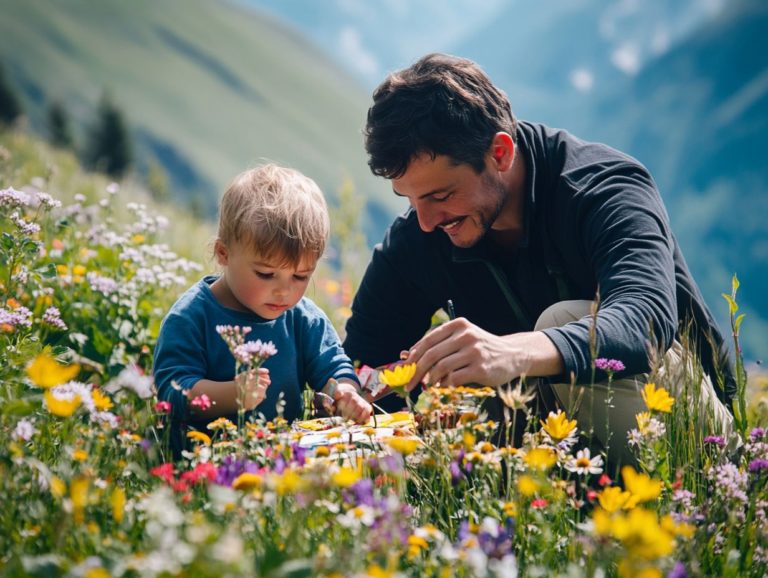5 Ways to Use Nature for Parental Self-Care
In today s fast-paced world, you may find yourself juggling countless responsibilities as a parent, often leaving little room for self-care. Nature presents a powerful antidote to stress and anxiety, benefiting not just adults but children as well. Engaging in activities like forest bathing and photography can elevate your connection with nature.
This article delves into five enriching activities you can share with your child such as taking nature walks and planting gardens that not only foster connection but also enhance well-being. These activities support healthy routines and nurture yourself and your child.
Discover how spending time outdoors can strengthen your bond with your child while offering both of you the rejuvenation you truly deserve. Embrace activities that support your mental health and give you opportunities for personal growth.
Contents
- Key Takeaways:
- 3. Plant a Garden Together
- 4. Practice Mindful Breathing Outdoors
- 5. Have a Nature Scavenger Hunt
- Why Is Nature Important for Parental Self-Care?
- How Can Nature Help Reduce Stress and Anxiety?
- What Are the Benefits of Spending Time in Nature with Your Child?
- How Can Nature Help Improve Your Relationship with Your Child?
- What Are Some Other Ways to Incorporate Nature into Your Self-Care Routine?
- What Are Some Tips for Making Time for Nature in a Busy Parenting Schedule?
- Frequently Asked Questions
- What are some benefits of using nature for parental self-care?
- How can I incorporate nature into my self-care routine as a parent?
- Why is nature a great source of self-care for parents?
- Easy Ways to Use Nature for Parental Self-Care
- Benefits for Children
- Frequency of Nature in Your Routine
Key Takeaways:

- Take a nature walk with your child for a low-cost and rejuvenating self-care activity. This can also serve as a form of nature therapy for both of you.
- Enjoy a picnic in the park to reconnect with your child and soak in the calming effects of nature. This is your chance to have fun with your kids and meet new families too!
- Planting a garden together is a fun and therapeutic way to spend quality time with your child while also caring for yourself. This community activity fosters relationships and supports emotional well-being.
1. Take a Walk in Nature with Your Child
Taking a walk in nature with your child presents a remarkable opportunity to deepen your connection with the outdoors. This activity enhances emotional well-being for both of you while addressing personal needs and offering effective stress management.
Doing this simple activity is easy and effective. It allows you to model healthy habits, boost your child s confidence, and create joyful experiences that elevate your quality of life.
Beyond strengthening your family bonds, these nature walks can serve as a unique platform for mindfulness practices. You and your child can engage your senses taking in the vibrant colors, the soothing sounds of rustling leaves, and the invigorating scent of pine. This mindful engagement not only bolsters emotional resilience but also fosters a greater appreciation for the natural world.
As community support for outdoor activities flourishes, families like yours enjoy a sense of belonging that nurtures mental health. Consider starting a gratitude journal to further enrich your experiences in nature.
By participating in organized nature walks or community gardening projects, both you and your child can experience the uplifting power of shared experiences. This reinforces your emotional connections while simultaneously cultivating a healthier mindset.
2. Have a Picnic in the Park
Enjoying a picnic in the park is a wonderful way for you to spend quality time with your children. It provides a chance to relax and engage in joyful experiences while fostering community interactions and promoting healthy meals in the great outdoors.
This outing is a great chance to introduce:
- Fresh fruit salads
- Whole grain wraps
- Vibrant veggie sticks
To inject some excitement into the day, think about incorporating fun games such as frisbee, sack races, or a scavenger hunt to keep the kids entertained and actively engaged.
Picnics strengthen family bonds and help you connect with neighbors, creating a strong sense of belonging and shared joy. Altogether, these elements contribute to unforgettable memories, making picnics an ideal family tradition. The relaxing music of nature can enhance this joyful activity.
3. Plant a Garden Together
Planting a garden together is more than just getting your hands dirty. It enriches emotional well-being and personal growth for both you and your children.
It also offers you a wonderful opportunity for self-care and boosts your confidence as you nurture living things. This is a perfect example of radical self-care and balancing life through meaningful activities.
This hands-on experience instills a profound sense of responsibility in children. It allows them to witness the fruits of their labor, fostering resilience and a sense of accomplishment.
As they tend to their plants, they ll face challenges that promote problem-solving and critical thinking skills.
Consider exploring creative gardening ideas, like community garden projects or family-themed planting days. These activities can deepen connections and strengthen family bonds.
Involving neighbors in a shared garden space cultivates plants and fosters relationships. It encourages collaboration and promotes a healthier, more engaged community, aligning with community parenting and supporting mental health.
Ultimately, gardening activities significantly contribute to mental health, offering therapeutic solace through nature s embrace.
4. Practice Mindful Breathing Outdoors

Practicing mindful breathing outdoors offers a valuable opportunity for you and your children. It enhances emotional well-being, reduces stress, and fosters a deeper connection with nature.
These relaxation techniques can seamlessly integrate into your daily lives. They can transform into healthy habits that improve your family dynamics and emotional balance.
To begin this enriching experience, seek out a serene outdoor setting perhaps a tranquil park or a quiet backyard. The soothing sounds of nature can complement your practice.
Encourage your children to sit comfortably or lie down. Have them close their eyes to fully tune into their breath. Guide them to inhale deeply through their noses, allowing their bellies to expand, and then slowly exhale through their mouths, visualizing stress drifting away from their bodies.
After a few rounds of this calming exercise, gently prompt them to notice the sounds surrounding them, the feel of the breeze, or the warmth of the sunlight on their skin. This reinforces the notion that mindfulness can significantly enhance their emotional balance.
This practice not only cultivates relaxation but also nurtures a profound appreciation for the natural world. It creates cherished moments of connection that you all can carry with you. Incorporating mindful parenting techniques can further elevate these experiences.
5. Have a Nature Scavenger Hunt
Organizing a nature scavenger hunt offers a delightful opportunity to inspire exploration and curiosity in children. It promotes community interaction and positive energy.
This activity allows families to connect with their surroundings and engage their senses fully. It supports mental health and fosters socializing with kids in a fun environment.
As participants immerse themselves in the natural world, they can discover an array of treasures, from vibrant leaves to unique rocks and even the melodious sounds of various birds.
This activity serves as an exceptional educational tool. It teaches children about local flora and fauna while fostering critical thinking and teamwork.
Children will learn to observe their environment with keen attention, activating their senses of sight, sound, and touch. These enriching experiences deepen their appreciation for nature and enhance their thinking skills, making the learning process both memorable and enjoyable.
Encourage them to keep a nature journal to document their discoveries and feelings, further enhancing their connection with nature.
Such outdoor adventures can instill a lasting love for the natural world, encouraging children to value and protect their environment as they grow.
Why Is Nature Important for Parental Self-Care?
Nature serves as a vital source for your parental self-care, offering a refuge for stress management and emotional well-being. It invites you to reconnect with your fundamental needs, ultimately elevating your mental health and cultivating a supportive atmosphere that nurtures both your personal growth and family dynamics. This deep-rooted connection with nature can help alleviate parent fatigue.
Research underscores the power of natural settings in reducing cortisol levels the hormone linked to stress leading to a more tranquil state of mind. For instance, a 2015 study published in the journal Environmental Science and Technology revealed that dedicating just 20 minutes a day to nature can enhance your mood and overall sense of well-being. Spending time engaging in nature connection activities, like guided meditation and relaxation techniques, can further enhance these benefits.
Being outdoors not only allows you to engage in community activities but also helps you forge connections with others navigating similar experiences. This sense of belonging diminishes feelings of isolation and enriches your overall life satisfaction. The advantages of nature extend far beyond simple relaxation.
How Can Nature Help Reduce Stress and Anxiety?
Engaging with nature significantly reduces stress and anxiety, providing a serene backdrop that facilitates relaxation techniques vital for your mental health and emotional well-being. Nature therapy is an effective method for achieving this.
The benefits are numerous and can be found in a variety of outdoor activities. Whether it s hiking, gardening, or simply enjoying a leisurely stroll in a park, these physical pursuits boost your mood through the release of endorphins. They also heighten your sensory experience with the rich sights, sounds, and scents of the natural world. Including your children in these activities can strengthen your family bonds and provide joyful experiences that everyone enjoys.
Spending time in green spaces is a game-changer for stress relief! It can lower your cortisol levels, a sign of stress. Engaging in community activities within these green spaces fosters a sense of belonging and provides emotional support.
Individuals who regularly immerse themselves in nature often share testimonials of experiencing a profound sense of peace and clarity. These moments can act as a form of mindfulness practice, offering a welcome reprieve from the overwhelming pressures of daily life. Consider practicing guided meditation during these moments to enhance your relaxation experience.
What Are the Benefits of Spending Time in Nature with Your Child?

Spending time in nature with your child offers a wealth of benefits, including enhanced emotional well-being, strengthened family bonds, and opportunities for personal growth. All of these factors significantly elevate your overall quality of life. These shared experiences in nature can also nurture your child’s healthy self-esteem and confidence, making them valuable for development.
Research indicates that regular exposure to natural environments boosts mood and reduces stress. It also fosters a profound sense of belonging and connectedness among family members. For instance, a study published in the Journal of Environmental Psychology revealed that families engaging in outdoor activities together report feeling closer to one another. The shared experiences in nature create lasting memories that enrich your relationships.
Nature serves as a natural playground, where your child can develop vital social skills through cooperative play, learning to communicate and collaborate effectively. These moments also provide you with a much-needed escape from everyday responsibilities, allowing for deeper conversations and richer interactions that contribute to a more harmonious home.
Even simple hikes or picnics can transform into valuable lessons about teamwork, resilience, and the importance of caring for the environment. These experiences further enhance the lives of both you and your child.
Get outside today and discover the joy of nature with your child!
How Can Nature Help Improve Your Relationship with Your Child?
Connecting with nature can significantly enhance your relationship with your child. It provides bonding experiences that elevate emotional well-being and create lasting memories, ultimately fortifying your family unit.
Engaging in nature-based activities like hiking, gardening, or bird-watching opens the door to meaningful communication and shared adventures that deepen the parent-child connection. Picture yourself hiking along a serene local trail; the tranquility of the surroundings sets the stage for conversations that often get drowned out in the hustle and bustle of daily life.
When gardening, you and your child can work side by side to take care of plants. This fosters a sense of responsibility and teamwork, making the experience even more rewarding.
These experiences not only encourage dialogue but also create a safe haven for your child to express their feelings. This opens the door for emotional support and understanding, weaving a stronger familial bond as you navigate the beauty of nature together.
What Are Some Other Ways to Incorporate Nature into Your Self-Care Routine?
Incorporating nature into your self-care routine can take many elegant forms. From invigorating outdoor exercise and serene nature therapy to the rewarding experiences of gardening and community volunteering, each of these activities supports healthy habits and manages stress effectively while addressing your personal needs.
Exploring local parks for leisurely walks or hikes invigorates your body and reconnects your mind with the soothing sounds and sights of the great outdoors. Picture yourself enjoying the gentle rustle of leaves and the chirping of birds as you stroll along a scenic path.
Join a community gardening project for fun and friendship, where social interaction beautifully intertwines with the therapeutic benefits of taking care of plants. It s a delightful way to cultivate both friendships and a flourishing garden.
Set aside time each week for mindfulness activities in nature, such as meditation or yoga. This fosters a deeper appreciation for the environment while nurturing your personal well-being. By integrating these practices into your daily life, you can cultivate a balanced routine that resonates with your individual interests and strengthens your connections to the community.
What Are Some Tips for Making Time for Nature in a Busy Parenting Schedule?
Making time for nature amidst a hectic parenting schedule requires intentional planning and a touch of creativity. By prioritizing healthy routines and weaving family activities into your daily life, you can ensure that both you and your children reap the benefits of the outdoors restorative power.
To successfully carve out this essential time, consider scheduling regular outdoor family outings, such as weekend hikes or nature walks. Treat these excursions as exciting events to anticipate together. Involving your children in the planning process not only gives them power but also nurtures a sense of responsibility towards nature.
You can effortlessly integrate outdoor activities into your existing routines perhaps by biking to school or enjoying picnics in the park after classes. By consistently embedding these nature experiences into your daily life, you foster a lasting connection with the environment, enhancing your family’s well-being while nurturing a deep-seated love for the natural world.
Frequently Asked Questions

What are some benefits of using nature for parental self-care?
Some benefits of using nature for parental self-care include reduced stress and anxiety, improved mental clarity and focus, increased relaxation and rejuvenation, and enhanced overall well-being.
How can I incorporate nature into my self-care routine as a parent?
You can incorporate nature into your self-care routine as a parent by taking walks or hikes in nature, having a picnic outdoors, practicing mindfulness in natural surroundings, gardening, and participating in outdoor activities such as swimming or biking.
Why is nature a great source of self-care for parents?
Nature is a great source of self-care for parents because it allows for a break from daily responsibilities and stresses, promotes physical activity and movement, and provides a peaceful and calming environment to recharge and reflect.
Easy Ways to Use Nature for Parental Self-Care
Spending time outside is a simple way to practice self-care. Incorporating nature into your daily tasks, engaging in outdoor hobbies, and visiting local parks can also help.
Benefits for Children
Using nature for self-care is beneficial for your children too. They learn from your practices and enjoy improved mood, creativity, and physical health by spending time outside.
Frequency of Nature in Your Routine
Try to incorporate nature into your routine a few times a week. Even a brief daily experience in nature can greatly benefit both you and your child.






